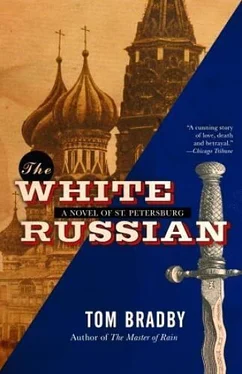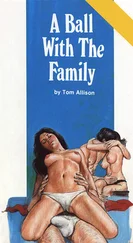“You don’t know her?”
The man shook his head. He glanced at the photograph of the body at the Lion Bridge. “Who was he?”
“His name was Markov. He was from Yalta.”
“From Yalta?”
“Yes. Both men, and the woman at the Finland Station, were stabbed repeatedly. It’s possible the murders had something to do with the material you were being offered.”
Neither man met his eye.
“What was it?” Ruzsky asked.
Ruzsky could see that White had told them exactly what he had in his possession. “It was revealing,” he went on. “That’s what they told you. Something revealing that related to the personal lives of the imperial family…”
The editor put the photographs back in a pile and moved them to the other side of the desk, as if trying to distance himself from them.
“He said it was evidence we would wish to print.”
“Evidence?”
“Yes.”
“Of what?”
The editor shrugged. “Of the corruption of the Romanovs.”
“What kind of evidence?”
“He was… vague about the detail.”
“Where did he say he had got this material?” Ruzsky asked.
“He didn’t.”
“An American walks in alone, off the street, and promises you material such as this and you believe him?”
“He did not come in off the street. Nor was he alone.”
“He was with the girl?” Ruzsky pointed at the top photograph. “With Ella.”
“Not with her.”
“Who then?”
“I do not feel inclined to tell you.”
“Someone you knew?”
“Someone whose sympathies we know of.” The editor smiled. He had recovered his confidence. “We wished to examine the material,” he said, smugly. “That was all.”
“What proof did they offer that it was genuine?”
“We did not get that far.”
“You were told that the material had been stolen?”
“It was intimated. But, as you will understand, we did not wish to investigate that too closely until we had at least had sight of it.”
“You were told you could meet the woman who had acquired it?” Ruzsky asked. He leaned forward and pointed at the picture of Ella’s bloodied body on the ice. “They told you this girl worked out at Tsarskoe Selo from where the material you were promised was stolen?”
“Naturally, we would have handed any stolen property over to the police.”
“Naturally. You planned a private printing?”
Neither man answered.
“Why did they offer you this material?” Pavel said.
“They did not say.” The editor held his gaze.
“The American came with a man?”
“No.”
“A woman. Did she give you her name?”
“I cannot give you the woman’s identity,” he said calmly.
“The material was never delivered?” Ruzsky asked.
The editor shook his head.
“But you were expecting it?”
“The agreement was that it would be delivered this morning before eight.” The editor looked at the clock on the wall beside him. It had just gone three. “And, upon verification, we’d have printed for tomorrow morning. I imagine your presence means it is unlikely we will ever receive it.”
“It was supposed to be delivered today?”
“That is correct.”
“You set a deadline?”
“No. The American was quite specific; he wanted the material on the streets late this evening or early tomorrow morning. Not before, not after.”
“Why?”
“No reason was given.”
Pavel and Ruzsky looked at each other. “They must have given you some indication?”
The editor shook his head.
“But you accepted their demand?”
“We accepted nothing.” The man leaned forward. “We promised what we needed to in order to be able to gain access to the material. Naturally, once it was in our hands, the question of its distribution was for us alone.”
Ruzsky got to his feet. “Thank you for your time,” he said.
They stopped in the lobby to light cigarettes. “Vasilyev has been behind this from the start,” Ruzsky said. “He put Ella up to the theft. Then he must have claimed that his intelligence was that a group of revolutionaries wished to publish it…”
Ruzsky began walking again. “Let’s go back to the office,” Ruzsky said.
A nother crowd of protesters was streaming past the entrance to the city police headquarters. The demonstrations seemed to Ruzsky to be getting bigger, but quieter. This one was led by a group of Tartar waiters carrying a banner demanding “fair tips” and he would have laughed, but there was nothing amusing about the hunger he saw in every face.
Ruzsky glanced over his shoulder at the automobile that had pulled up behind them. Vasilyev’s men were also momentarily distracted by the protest.
The last stragglers passed by and Ruzsky and Pavel crossed the road. A constable stood between two men in handcuffs in front of the incident desk.
Ruzsky climbed the stairs fast, pulling away from Pavel. In the central area of the Criminal Investigation Division, he passed Maretsky, who stood at his own window, watching the march.
Another pile of papers had accumulated upon Ruzsky’s desk, on top of which was a note from Veresov, headed Bodies on the Neva.
Veresov had found no match for the fingerprints on the dagger in their files, so, whoever the killer was, he did not have a criminal record. Perhaps it was his imagination, but it seemed to Ruzsky that the present uncertainty was seeping into every corner of the city. No one was concentrating.
He poked his head around Maretsky’s door, ignoring the sporadic shouts from below. “What about the knife?”
The little man turned around, his porcine eyes examining Ruzsky as though he were a complete stranger. “I’m sorry?”
“The knife. The murder weapon.”
“Oh. Professor Egorov will be back soon,” he said.
“I thought you said he was due to return several days ago?”
“He has been delayed.”
Maretsky faced the street again and Ruzsky returned to his office, closing the door quietly behind him. He picked up the telephone. “Could you put me through to the university?” he asked.
There was a long wait.
“Porter’s lodge,” a voice answered.
“Might I speak to or leave a message for Professor Egorov.”
“Professor Egorov?”
“Yes.”
“We have no Professor Egorov.”
Ruzsky stared at Pavel, who stopped riffling through his own paperwork.
“Are you there?” the voice asked.
“Yes. You’re sure?”
“Of course.”
“Thank you,” Ruzsky said.
The professor was sitting behind his desk, staring at his hands. He looked up as Ruzsky returned, and closed his eyes.
Ruzsky took a seat opposite and waited for an explanation.
“I admire you, Ruzsky,” Maretsky said quietly, opening his eyes. “You’re honest. And you don’t judge people.”
“That’s not true.”
“You don’t judge me.”
Ruzsky looked at Maretsky with compassion. “Who am I to judge anyone?”
“Anton is a good man.”
Ruzsky did not see what the professor was getting at.
“He has tried to protect us. But they know everything that we do, so it is hard for him.”
“I don’t see-”
“We have to be careful what information we bring into the building, don’t you see that?”
Ruzsky inclined his head.
“I gave the knife to a colleague. His name is not Egorov. I will take you to see him.” Maretsky stood and put on his coat.
They crossed the bridge from Palace Embankment to Vasilevsky Island, where the cab turned left and slithered down toward the Twelve Colleges building at the far end of the street. Ruzsky made a point of not looking around to check whether they were still being followed, but Maretsky could not restrain himself. “It’s all right, old man,” Pavel told him jovially, but Ruzsky could sense the tension in his voice, too.
Читать дальше












